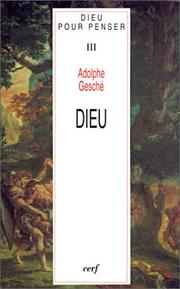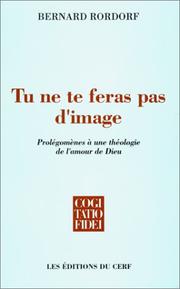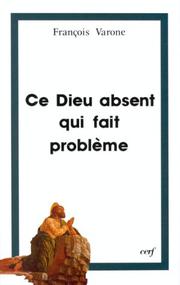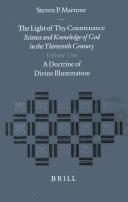| Listing 1 - 10 of 12 | << page >> |
Sort by
|
Book
ISBN: 3787313680 9783787313686 Year: 2000 Volume: 6 Publisher: Hamburgi Meiner
Abstract | Keywords | Export | Availability | Bookmark
 Loading...
Loading...Choose an application
- Reference Manager
- EndNote
- RefWorks (Direct export to RefWorks)
Natural theology --- 231.133.11 --- Kenbaarheid van God --- 231.133.11 Kenbaarheid van God
Book
ISBN: 2204020435 9782204020435 Year: 1986 Publisher: Paris Cerf
Abstract | Keywords | Export | Availability | Bookmark
 Loading...
Loading...Choose an application
- Reference Manager
- EndNote
- RefWorks (Direct export to RefWorks)
231.133.11 --- #gsdb3 --- 231.133.11 Kenbaarheid van God --- Kenbaarheid van God
Book
ISBN: 2845731752 9782845731752 Year: 2003 Publisher: Paris Parole et Silence
Abstract | Keywords | Export | Availability | Bookmark
 Loading...
Loading...Choose an application
- Reference Manager
- EndNote
- RefWorks (Direct export to RefWorks)
Multi
ISBN: 9781107685949 9780521769204 9781139032797 9781139190411 1139190415 1139032798 9781139187824 1139187821 9781107225305 1107225302 0521769205 9786613378521 6613378526 9781283378529 1283378523 1139179497 9781139179492 1139189107 9781139189101 1139183192 9781139183192 1139185519 9781139185516 110768594X Year: 2012 Publisher: New York Cambridge university press
Abstract | Keywords | Export | Availability | Bookmark
 Loading...
Loading...Choose an application
- Reference Manager
- EndNote
- RefWorks (Direct export to RefWorks)
"In this chapter I argue for a reassessment of current academic opinion regarding the theme of the spiritual senses in the writings of Origen of Alexandria (c. 185--c. 254). Specifically, John Dillon has claimed that it is exclusively in Origen's late works that one finds a 'proper' doctrine of the spiritual senses (the crucial features of which will be discussed below).1 Dillon argues that Origen's early works, by contrast, evince only a metaphorical use of the language of sensation.2 The early Origen, according to this reading, is not actually describing the perception of spiritual realities, as is typically thought. Instead, in his early writings Origen uses terms such as 'seeing' and 'hearing' in a figurative manner to describe 'understanding', placing no particular value on the sensory dimension to the terms. In contrast to this assessment, however, I argue here that unexamined aspects of Origen's early writings in fact demonstrate noteworthy continuities between his early and late uses of sensory language. In particular, portions of Origen's early scriptural commentaries and Deprincipiis show that his 'doctrine of the spiritual senses' emerges much earlier than has been recently supposed"-- "Is it possible to see, hear, touch, smell and taste God? How do we understand the biblical promise that the 'pure in heart' will 'see God'? Christian thinkers as diverse as Origen of Alexandria, Bonaventure, Jonathan Edwards and Hans Urs von Balthasar have all approached these questions in distinctive ways by appealing to the concept of the 'spiritual senses'. In focusing on the Christian tradition of the 'spiritual senses', this book discusses how these senses relate to the physical senses and the body, and analyzes their relationship to mind, heart, emotions, will, desire and judgement. The contributors illuminate the different ways in which classic Christian authors have treated this topic, and indicate the epistemological and spiritual import of these understandings. The concept of the 'spiritual senses' is thereby importantly recovered for contemporary theological anthropology and philosophy of religion"--
Senses and sensation --- Religious aspects --- Christianity. --- 231.133.11 --- -Sensation --- Sensory biology --- Sensory systems --- Neurophysiology --- Kenbaarheid van God --- -Kenbaarheid van God --- 231.133.11 Kenbaarheid van God --- -231.133.11 Kenbaarheid van God --- Sensation --- Knowledge, Theory of --- Psychophysiology --- Perception --- Religious aspects&delete& --- Christianity --- Christian church history --- Christian spirituality --- God (Christianity) --- Theological anthropology --- Knowableness. --- History of doctrines. --- Man (Christian theology) --- Knowableness of God --- Knowledge of God (Knowableness of God) --- Knowledge (Knowableness) --- Arts and Humanities --- Religion --- Senses and sensation - Religious aspects - Christianity.

ISBN: 2204048615 9782204048613 Year: 2001 Volume: 3 Publisher: Paris Cerf
Abstract | Keywords | Export | Availability | Bookmark
 Loading...
Loading...Choose an application
- Reference Manager
- EndNote
- RefWorks (Direct export to RefWorks)
Salvation. --- Anthropologie religieuse --- Mal --- Théologie --- Dieu. --- Foi. --- Guilt --- Theology --- Good and evil --- Guilt. --- Sin, Original --- Liberation theology --- Anthropologie théologique - Christianisme --- Good and evil. --- God (Christianity) --- Sin, Original. --- 231.133.11 --- Dogmatiek --- 231.133.11 Kenbaarheid van God --- Kenbaarheid van God --- #gsdb3 --- Anthropologie théologique

ISBN: 2204044377 9782204044370 Year: 1992 Volume: 167 Publisher: Paris Cerf
Abstract | Keywords | Export | Availability | Bookmark
 Loading...
Loading...Choose an application
- Reference Manager
- EndNote
- RefWorks (Direct export to RefWorks)
Theology. --- Eschatology. --- Image (Theology) --- 246.3 --- 231.133.11 --- Eschatology --- Theology --- Christian theology --- Theology, Christian --- Christianity --- Religion --- Christian art and symbolism --- Communication --- Last things (Theology) --- Religious thought --- Theology, Doctrinal --- Beelden in kerken. Beeldenverering. Iconoclasme --- Kenbaarheid van God --- Religious aspects --- 231.133.11 Kenbaarheid van God --- 246.3 Beelden in kerken. Beeldenverering. Iconoclasme

ISBN: 2204017809 9782204017800 Year: 1983 Publisher: Paris Les Éditions du Cerf
Abstract | Keywords | Export | Availability | Bookmark
 Loading...
Loading...Choose an application
- Reference Manager
- EndNote
- RefWorks (Direct export to RefWorks)
#GROL:MEDO-230.11 --- Atheism --- Faith --- God (Christianity) --- Prayer --- Religion --- #GGSB: Dogmatiek --- #GGSB: Godsleer --- 231.133.11 --- 231.133.11 Kenbaarheid van God --- Kenbaarheid van God --- Religion, Primitive --- God --- Irreligion --- Religions --- Theology --- Christianity --- Trinity --- Religious belief --- Theological belief --- Belief and doubt --- Salvation --- Theological virtues --- Trust in God --- Philosophy --- Agnosticism --- Free thought --- Secularism --- Theism --- Dogmatiek --- Godsleer --- Prayer - Christianity
Book
ISBN: 9789042936478 9042936479 9789042936973 Year: 2018 Volume: 300/A-B Publisher: Leuven Peeters
Abstract | Keywords | Export | Availability | Bookmark
 Loading...
Loading...Choose an application
- Reference Manager
- EndNote
- RefWorks (Direct export to RefWorks)
Parler de Dieu est aussi perilleux que necessaire. Aujourd'hui, pas plus qu'autrefois, il ne convient pas, en cette matiere cruciale entre toutes, de se contenter d'un simple mutisme. Mais de Dieu, on ne saurait poser une connaissance par l'homme sans qu'il faille alors poser une inconnaissance plus grande encore. La connaissance de Dieu, en derniere instance, est evenement eschatologique, qui dans l'histoire ne peut que s'anticiper. Le parcours ici propose comprend pas moins de dix-huit chapitres. Pour en avoir une synopse plus aisee, il convient de les regrouper, comme l'indique la Conclusion de l'ouvrage, en sept ensembles. Un premier ensemble (chapitres I et II) traite de l'acces a Dieu d'abord par le chemin de la religion (chap. I), puis par celui de la theologie naturelle (chap. II). Un deuxieme ensemble (embrassant les chapitres III a V) presente les preuves de Dieu (chap. III), leur critique par Kant (chap. IV), et le depassement hegelien de la critique kantienne (un depassement pretant lui-meme le flanc a la critique, chap. V). Dans un troisieme ensemble (incluant les chapitres VI et VII), les monotheismes (chap. VI) contrastent avec les atheismes (chap. VII). Un quatrieme ensemble (chapitres VIII et IX) considere le langage religieux (chap. VIII), la doctrine de l'analogie et la theologie negative (chap. IX). Un cinquieme ensemble (chapitres X a XIII) a trait a l'experience chretienne (chap. X), la mystique (chap. XI), l'inconnaissance de Dieu selon Eckhart (chap. XII), et la question de Dieu chez Heidegger (chap. XIII). Un sixieme ensemble (chapitres XIV et XV) aborde les deux themes principaux de la theologie fondamentale (saisie en tant que partie de la theologie) : la revelation (chap. XIV) et la foi (chap. XV). Un septieme et dernier ensemble (chapitres XVI a XVIII) s'interroge sur l'essence et les attributs de Dieu (chap. XVI), le rapport entre le Dieu impassible et la mort (chap. XVII), et la vision du Dieu invisible dont jouissent les bienheureux apres la mort (chap. XVIII). On peut distribuer ces sept ensembles en trois parties principales : on passe de la thematique des diverses religions et de la raison " naturelle " (premier et deuxieme ensembles) au differend entre monotheisme, notamment chretien, et differentes formes d'atheisme, voire de mysticisme purement naturaliste (troisieme, quatrieme et cinquieme ensembles) ; et on se centre, pour finir, sur la foi catholique dans la revelation du Dieu trinitaire librement engage dans la kenose redemptrice, et sur l'esperance de la " vision " (sixieme et septieme ensembles).
Doctrine of God (christianism) --- God --- Philosophical theology --- Negative theology --- 231.133.11 --- GBIB: jesuitica --- 231.133.11 Kenbaarheid van God --- Kenbaarheid van God --- Theology, Philosophical --- Philosophy and religion --- Theology, Doctrinal --- Metaphysics --- Misotheism --- Monotheism --- Religion --- Theism --- History of doctrines --- Knowableness&delete& --- Proof --- Proof&delete& --- Knowableness
Book
ISBN: 9783451023200 3451023202 9783451833205 3451833204 Year: 2022 Publisher: Freiburg im Breisgau Verlag Herder
Abstract | Keywords | Export | Availability | Bookmark
 Loading...
Loading...Choose an application
- Reference Manager
- EndNote
- RefWorks (Direct export to RefWorks)
"Ist eine Gotteserkenntnis unabhängig vom Glauben möglich? Setzt der Glaube, wenn er sich weiterhin als fides quaerens intellectum versteht, nicht ein Wissen von Gott voraus, das vielen heute kaum noch erreichbar erscheint? Muss dann aber nicht das Konzept ad acta gelegt werden? Was vermag ein Rückbezug auf die philosophische und theologische Tradition noch zu leisten? Kann etwa den traditionellen Gottesbeweisen noch Relevanz zuerkannt werden? Die Beiträge bieten einen Überblick über ganz unterschiedliche Ansätze der gegenwärtigen Theologie und Religionsphilosophie und befördern so die Diskussion."
God (Christianity) --- God --- Faith --- 231.133.11 --- 231.12 --- Knowableness of God --- Knowledge of God (Knowableness of God) --- 231.12 Wezen van God --- Wezen van God --- 231.133.11 Kenbaarheid van God --- Kenbaarheid van God --- Religious belief --- Theological belief --- Belief and doubt --- Religion --- Salvation --- Theological virtues --- Trust in God --- Knowableness --- Proof --- Knowledge (Knowableness)

ISSN: 00818607 ISBN: 9004120645 9004119477 9004120653 9786610464517 1417536632 1280464518 9047400666 9781417536634 9789047400660 9789004119475 9789004120648 9789004120655 Year: 2001 Volume: 98 Publisher: Leiden Boston Brill
Abstract | Keywords | Export | Availability | Bookmark
 Loading...
Loading...Choose an application
- Reference Manager
- EndNote
- RefWorks (Direct export to RefWorks)
This work documents the development of scholastic argumentation in 13th century Europe. It traces the rise of a formal model of science and resulting accommodations in traditional attitudes towards human cognition, especially with regard to the role of divine illumination.
God (Christianity) --- Knowledge, Theory of (Religion) --- Religion and science --- Knowableness --- History of doctrines. --- History. --- Thirteenth century. --- Dertiende eeuw --- Thirteenth century --- Treizième siècle --- 231.133.11 --- -Religion and science --- -Thirteenth century --- God --- -13th century --- Middle Ages --- 231.133.11 Kenbaarheid van God --- Kenbaarheid van God --- Christianity and science --- Geology --- Geology and religion --- Science --- Science and religion --- Religious knowledge, Theory of --- Religion --- Theology, Doctrinal --- Metaphysics --- Misotheism --- Monotheism --- Theism --- History --- -History of Doctrines --- Religious aspects --- Philosophy --- Epistemology, Religious --- Religious epistemology --- Christianity --- Trinity --- Knowableness&delete& --- History of doctrines --- History of controversy --- 13th century --- God (Christianity) - Knowableness - History of doctrines. --- Knowledge, Theory of (Religion) - History. --- Religion and science - History.
| Listing 1 - 10 of 12 | << page >> |
Sort by
|

 Search
Search Feedback
Feedback About UniCat
About UniCat  Help
Help News
News